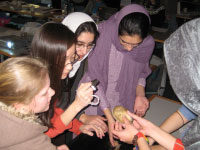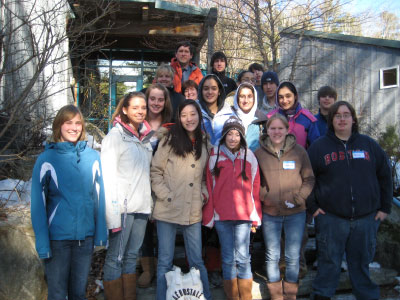Faculty/Graduate Student Collaborative Workshop at the DMC
Workshop Theme: Ocean-Climate Connections |
|
Held at the Darling Marine Center in Walpole, ME
Friday, January 29, 2010 and Monday through Tuesday, February 1-2, 2010 |
|
|
|
A new feature of this collaborative workshop was the participation by a group of high school students and faculty from Waterville Senior High
School in Waterville, ME. On the third day, three science teachers, Rosemarie Smith, Jon Ramgren, and Jody Veilleux, came to the Darling
Marine Center accompanied by 15 students ranging from freshman to seniors. The students played a valuable role by serving as a "test audience"
for the graduate students who presented the "consensus" concept maps they had developed in collaboration with the research faculty on the previous
day. (Some of the high school students were also members of the school's Ocean Science Bowl team, which was due to compete in the Nor' Easter Bowl
on the following weekend! [The Nor' Easter Bowl is the Northeast regional competition for the National Ocean Science Bowl.])
The "third party" participation by the high school group provided manifold opportunities for all workshop participants. For the high school
students it afforded a chance to gain additional (or perhaps new) exposure to important ocean and climate science material. For the faculty
it was a chance to see how their original messages were translated to an intended audience, and the graduate students got the chance to
practice presenting scientific content to a non-scientist audience while gaining valuable feedback in the process. While the graduate students
explained the content of the concept maps, the high school students completed feedback forms about each presentation. Their answers to Likert
scale questions were enriched by their deeply insightful and substantive comments about the format and content of the presentations.
The ocean and climate literacy science content that the high school students were exposed to included the use of computer models to determine
whale location patterns, using sensors and technology to map what is unknown about the ocean, climate processes that affect the burial/sequestration
of carbon in marine sediments, the role of benthic organisms in the carbon cycle, and the affect of climate change on marine food webs.
|







